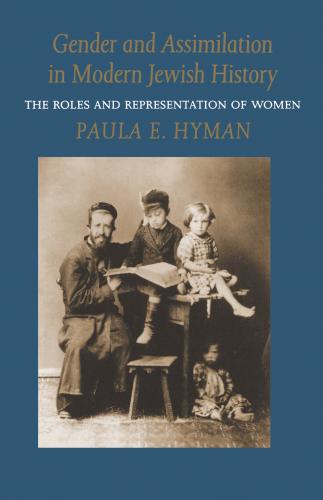The Samuel & Althea Stroum Lectures
IN JEWISH STUDIES
The Samuel & Althea Stroum Lectures
IN JEWISH STUDIES
The Yiddish Art Song performed by Leon Lishner, basso, and Lazar Weiner, piano (stereophonic record album)
The Holocaust in Historical Perspective by Yehuda Bauer
Zakhor: Jewish History and Jewish Memory by Yosef Hayim Yerushalmi
Jewish Mysticism and Jewish Ethics by Joseph Dan
The Invention of Hebrew Prose: Modern Fiction and the Language of Realism by Robert Alter
Recent Archaeological Discoveries and Biblical Research by William G. Dever
Jewish Identity in the Modern World by Michael A. Meyer
I. L. Peretz and the Making of Modern Jewish Culture by Ruth R. Wisse
The Kiss of God: Spiritual and Mystical Death in Judaism by Michael Fishbane
Gender and Assimilation in Modern Jewish History: The Roles and Representation of Women by Paula E. Hyman
Portrait of American Jews: The Last Half of the 20th Century by Samuel C. Heilman
Gender and Assimilation in Modern Jewish History
The Roles and Representation of Women
Paula E. Hyman
University of Washington Press
Seattle & London
Copyright © 1995 by the University of Washington Press
Second printing, 1997 (pbk.)
Printed in the United States of America
All rights reserved. No part of this publication may be reproduced or transmitted in any form or by any means, electronic or mechanical, including photocopy, recording, or any information storage or retrieval system, without permission in writing from the publisher.
Library of Congress Cataloging-in-Publication Data
Hyman, Paula, 1946–
Gender and assimilation in modern Jewish history : the roles and representation of women / Paula E. Hyman.
p. cm. — (The Samuel & Althea Stroum lectures in Jewish studies)
Includes bibliographical references and index.
ISBN 0-295-97425-7 (cloth). — ISBN 0-295-97426-5 (pbk.)
1. Jews — Cultural assimilation — Europe. 2. Jews — Cultural assimilation — United States. 3. Jewish women — Europe — Social conditions. 4. Jewish women — United States — Social conditions. 5. Europe — Ethnic relations. 6. United States — Ethnic relations.
I. Title. II. Series: Samuel and Althea Stroum lectures in Jewish studies.
DS148.H93 1995
305.48′696 — dc20 94-37932 CIP
The paper used in this publication meets the minimum requirements of American National Standard for Information Sciences — Permanence of Paper for Printed Library Materials, ANSI Z39.48–1984.
The Samuel & Althea Stroum Lectures
IN JEWISH STUDIES
Samuel Stroum, businessman, community leader, and philanthropist, by a major gift to the Jewish Federation of Greater Seattle, established the Samuel and Althea Stroum Philanthropic Fund.
In recognition of Mr. and Mrs. Stroum’s deep interest in Jewish history and culture, the Board of Directors of the Jewish Federation of Greater Seattle, in cooperation with the Jewish Studies Program of the Henry M. Jackson School of International Studies at the University of Washington, established an annual lectureship at the University of Washington known as the Samuel and Althea Stroum Lectureship in Jewish Studies. This lectureship makes it possible to bring to the area outstanding scholars and interpreters of Jewish thought, thus promoting a deeper understanding of Jewish history, religion, and culture. Such understanding can lead to an enhanced appreciation of the Jewish contributions to the historical and cultural traditions that have shaped the American nation.
The terms of the gift also provide for the publication from time to time of the lectures or other appropriate materials resulting from or related to the lectures.
To my daughters, JUDITH and ADINA
Contents
3. America, Freedom, and Assimilation
4. The Sexual Politics of Jewish Identity
Preface
I have been interested in the history of Jewish women since my days as a graduate student some twenty years ago. Although my own professional training was conspicuously silent on the subject of women, and gender was a concept of interest only to anthropologists studying primitive tribes, my involvement with feminism at the university and in the Jewish community sparked my curiosity about women in the past and the role of gender in human experience. Beginning with a collaborative effort on the history of Jewish women in America, whenever time permitted I returned to the subject of women in modern Jewish history. As I read more broadly in the growing and ever more sophisticated literature in general women’s history and pursued my own research, I became convinced that there was much to say about the relation between gender and the encounter of Jews with the various conditions of modernity. The invitation to offer the Stroum Lectures at the University of Washington in 1992 permitted me to reflect upon the roles and representation of Jewish women as Jews struggled to define a place for themselves in Europe and America. The questions that I raise in this slim volume, though limited to Ashkenazi Jews, will, I hope, stimulate others to investigate the experience of women and gender representations in Sephardi communities and in other parts of the Jewish world, including the prestate yishuv and Israeli society.
The publication of this book provides me with the happy opportunity of thanking a series of individuals who contributed to its appearance. Samuel and Althea Stroum’s generosity and commitment to Jewish learning provided the framework for the lectures which form the basis of this book. I am most grateful to Professor Hillel Kieval and his colleagues in the University of Washington’s Jewish Studies Program for inviting me to Seattle. Their gracious hospitality, ably coordinated by the program’s assistant, Dorothy Becker, combined with unusually warm and sunny weather to offer a serene setting for reflecting on my subject in addition to delivering the lectures themselves. The questions from faculty and other members of the audience initiated a process of extending and
